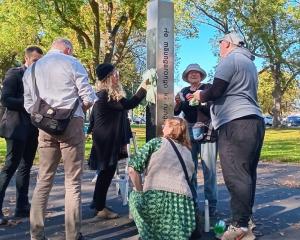Prof Cann, who is a professor of genetics at the University of Hawaii, is visiting Dunedin where she gave "Out of Africa", the first of a national series of lectures to mark the 20th anniversary of the death of influential New Zealand scientist Prof Allan Wilson.
Prof Cann, who undertook her doctoral studies at his American laboratory, said Prof Wilson was a major scientist and "incredibly creative".
A modest man, he had not sought publicity, she said.
He was born in Ngaruawahia, near Hamilton, and graduated from the University of Otago with a BSc in biochemistry in 1955. He also gained an Otago honorary doctor of science degree in 1989.
After starting PhD studies at the University of California, Berkeley, in the mid-1950s, he spent 35 years there, establishing an important biochemistry laboratory.
He died of leukemia in 1991, aged 56.
He is widely-known internationally for a scientific paper titled "Mitochondrial DNA and human evolution" (1987), written with Prof Cann and Mark Stoneking.
This paper, drawing on Prof Cann's doctoral research, showed all living females are descended from a single maternal ancestor, dubbed the "mitochondrial Eve", who lived about 150,000 years ago.
Mitochondria are energy-generating organelles found in human cells.
"If you were trying to take the long view of human history, I would say that we share more than the minor things that cause us to be different, much more," she said.
It was notable that all humans, provided they were of the same blood type, could share blood transfusions interchangeably among racial groups, she said.
In an earlier key paper, published in 1967, Prof Wilson used what he termed a "molecular clock" dating method, using the genetic mutations, to suggest the earliest human ancestors evolved only about five million years ago.
Many contemporary anthropologists, some favouring a date of about 25 million years, dismissed his work, but scientists now believe the date is actually about five to seven million years ago.












